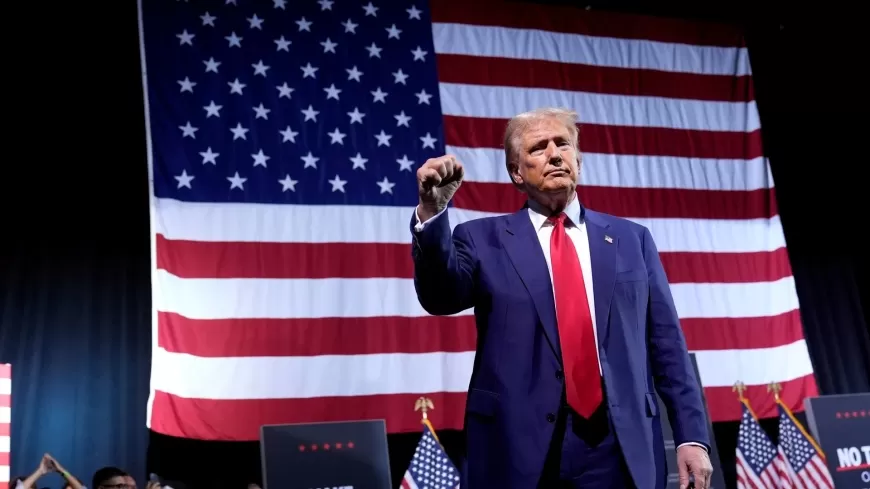Can Trump Deliver on His 2024 Tax Cut Promises Despite Challenges?
Trump’s 2024 tax cut promises offer big savings, but face high costs and obstacles. Will he be able to deliver on these pledges if re-elected?

Donald Trump, a leading contender for the 2024 U.S. presidential election, has made numerous tax promises during his campaign, with at least 10 new proposals aimed at appealing to key voting blocs. However, questions remain about how realistic these promises are and if they can be enacted should he win another term.
A Series of Costly Tax Pledges
At a recent campaign stop, Trump proposed making car loan interest fully tax-deductible, comparing the idea to the mortgage interest deduction that homeowners currently enjoy. The day before, he promised to remove “double taxation” for Americans living overseas, ensuring expatriates avoid being taxed both by the U.S. and their host countries.
Here are the key tax promises made by Trump during his campaign:
- Full Deduction of Car Loan Interest: Making car loan interest fully tax-deductible to aid vehicle affordability.
-
Elimination of Double Taxation for Expats: Ensuring Americans living abroad are not taxed by both the U.S. and their host countries.
-
Extension of the 2017 Tax Cuts: Continuation of the provisions from the Tax Cuts and Jobs Act, which is set to expire in 2025.
-
No Tax on Tips: Proposing the elimination of taxes on tips earned by service workers.
-
No Tax on Overtime: Removing taxes on overtime pay to boost earnings for workers putting in extra hours.
-
Tax Exemption on Social Security Benefits: Eliminating taxes on Social Security benefits for retirees.
-
Introduction of New Tax Incentives for Homeownership: Offering incentives to encourage home purchases and ownership.
-
Corporate Tax Rate Reduction: Slashing the corporate tax rate to 15%, down from the current 21% set in 2017.
-
Child Tax Credit Expansion: Considering a significant expansion of the child tax credit to provide more support for families.
-
Tariffs as Implicit Tax Increases: Imposing new tariffs on imports, which would effectively act as taxes on consumers by raising prices on goods.
Costs and Opposition
While these proposals may sound appealing to voters, they come with significant financial implications. The Committee for a Responsible Federal Budget (CRFB) estimates that Trump’s promises could cost the government over $9 trillion in the next decade. This figure doesn’t even account for some recent proposals, including the car loan interest deduction or other tax changes lacking details.
Trump has offered few solutions for how these cuts will be funded. With many Republicans in Congress already wary of increasing the national debt, Trump may face opposition within his own party in getting these changes passed into law.
Appealing to Key Voter Groups
Trump’s tax ideas are tailored to specific groups he hopes to win over in the 2024 election. For instance, his proposal to eliminate taxes on tips is aimed at service industry workers. At a rally in Reading, Pennsylvania, he asked the crowd, “Do we have any people that work in restaurants?” before promising them tax relief on tips.
Similarly, Trump announced his plan to make car loan interest deductible during a speech in Detroit, a city known for its auto industry. He believes this move would revolutionize car ownership, making it easier for Americans to afford vehicles.
When speaking to older voters, Trump has focused on his pledge to eliminate taxes on Social Security benefits. This idea, while appealing to seniors, raises concerns among experts that it could weaken the program’s financial stability.
Criticism and Economic Impact
Economists have raised red flags about many of Trump’s proposals, arguing that they could create significant imbalances in the tax system. For example, exempting tips and overtime from taxation, while still taxing regular wages, could distort economic incentives and lead to "horizontal inequities"—where two workers earning the same amount pay different tax rates based on how their income is categorized.
Democrats have also been critical of Trump’s plans, with Senate Finance Committee Chair Ron Wyden calling them “desperate” and “unrealistic.” He has questioned whether Republicans in Congress would even consider passing such proposals.
More Promises in the Works?
With weeks left until the election, Trump is likely not finished making tax-related promises. One area where he could announce more changes is the child tax credit. After GOP Vice Presidential nominee JD Vance expressed support for expanding the child tax credit, Trump is reportedly considering backing a "significant expansion" of the program, offering further relief to families.
Tariffs: A Hidden Tax Increase?
In addition to tax cuts, Trump has proposed new tariffs on imports. While he doesn’t refer to these tariffs as taxes, they would essentially act as such, as higher costs on imported goods would be passed on to American consumers. Experts warn that these tariffs could add thousands of dollars to U.S. family budgets, negating some of the benefits from Trump’s proposed tax cuts.
iShook Finance Expert Thought:
Donald Trump’s tax proposals are bold, but they come with high risks. The lack of a clear strategy to offset the costs could jeopardize both the federal budget and economic stability in the future. If Trump wants to convince voters that his tax cuts are feasible, he’ll need to provide more concrete plans to address concerns about rising debt and the overall fiscal health of the country.
As Trump continues to roll out new ideas, it’s clear his tax agenda is aimed at appealing to a broad range of voters. However, implementing such sweeping cuts while keeping the economy on solid ground will be a significant challenge. Whether Trump can deliver on his promises remains to be seen, but the stakes are higher than ever for both his campaign and the American economy.
Also Read: How Trump Could Change the Federal Reserve If He Wins Again































































